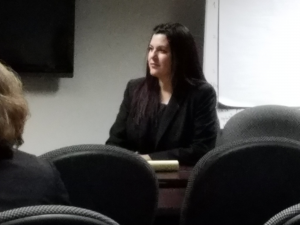Between teaching a law school class and conducting pre-trial interviews, Heather LeBlanc finds some time to pump breast milk. “I try to block off time, because what’s important to me is I have two kids that go to daycare and one who just started preschool, and I still nurse the infant,” she said.
LeBlanc is a full-time public defender, a mother of three children under the age of five, and has a husband currently deployed overseas in the Air Force.
“I’d say I’m a loving, dedicated mom who also has a passion for life in general and who really loves what she does at work,” she said. “Exhausted maybe, but generally very fulfilled. Once the kids crash out if I don’t have anything else to do, sometimes I fall asleep before they do.”
At work, LeBlanc fights for those who may not have had the loving environment she has in her home. Public defenders typically represent those who are indigent.

“I really actually like the clients whom I work with. I find them to be very decent human beings who end up in this place either because of how they were raised– their life circumstance,” she said. “To see the struggle these people have gone through, then I think, ‘is it really any wonder that you ended up where you are right now?’”
LeBlanc says many clients opt to take plea deals instead of taking their cases to trial because they’re scared and think attorneys won’t fight for them. Another factor is the financial calculation on both sides that goes into plea bargains.
Joshua Kastenberg, a law professor at the University of New Mexico, says financial considerations go into plea bargain decisions, especially since the both the public defender’s and district attorney’s offices are underfunded.
“A district attorney is the steward of the public’s money,” he said. “[In one case], the DA looked at the price tag [for going to trial] and accepted a plea. That trial would’ve cost him his entire budget for the year… it enabled the DA to go forward and prosecute other cases.”
Public defense in New Mexico is underfunded, and that causes a strain on the office. LeBlanc says they’re short of support staff, and if an attorney leaves, he or she might not be replaced. The office in Albuquerque also takes cases from other parts of the state.

“It does become very difficult but I’m fortunate to work with a lot of other dedicated individuals who really are doing their best not to have the clients suffer,” she said.
LeBlanc is on the performance standards committee, which evaluates what a manageable caseload for an attorney should be. She says a normal caseload depends on the types of cases.
“It’s really not something where I can just say ‘this number of cases,’ it’s a bit more complex than that. But we definitely have more than we should.”
LeBlanc says she averages 50 open cases at any given time, which is a lighter load than when she worked in Florida, where she would have 300 open cases.
Barry Porter, a former public defender who now does private practice, started in Honolulu, where he averaged 35 cases at a time. When he came to Albuquerque over 10 years ago, he had 70-100+ cases
“These are felony matters, people going to prison for a long, long time. So that was an incredible amount of stress for me,” Porter said. “That was a difficult transition for me, like oh, I can’t spend all the time I used to spend on a case.”
LeBlanc says some clients use whatever means they have to show their appreciation for her work.
“They’ll create a card from jail, and they’re actually very creative. ‘Thank you for fighting for me, no one’s ever fought for me before, this means the world to me whether we win or lose.’ To have someone say that when you go to trial and before we even get the verdict, it’s powerful.”
When it comes to balancing everything both at home and in the workplace, LeBlanc recommends taking one step at a time.

“Just focus on what you have to do for today. You will make it through the day. The day will be done at some point, you’ll get to sleep at some point. One foot in front of the other.”
Ultimately, one way of thinking helps her the most.
“Instead of thinking I have to do this, I have to do whatever, I shift it to I get to to do this, I get to do that. It becomes less of a burden and more something you can embrace as an opportunity. I get to do these things because I’m powerful because I’m loving, because this is what I choose for my life.”
For more follow Angela and Alissiea on Twitter